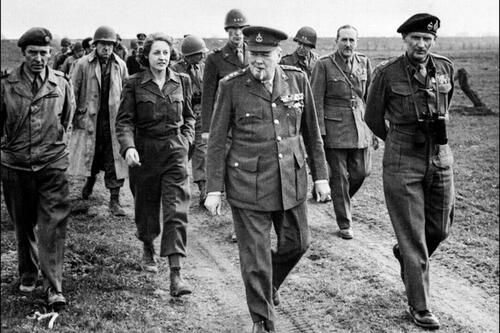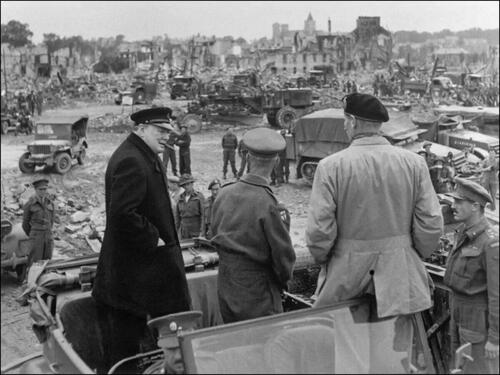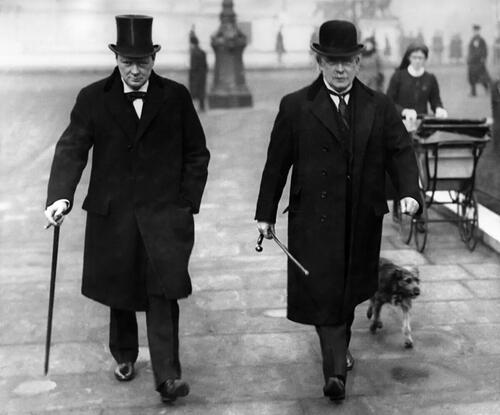5 Leadership Lessons From Winston Churchill For Today's World
Authored by Dustin Bass via The Epoch Times (emphasis ours),
Winston Churchill was a man of action. He was born in 1874, during a period known as the Pax Britannica (1815–1914) and during the relative peace that had settled over Europe after the Franco-Prussian War of 1870. Nonetheless, as a young man, Churchill understood that military service was a sure path toward political elevation. To become a great leader in the political theater, he believed he first needed to be one in the theater of war. The following is what was required to make him the greatest leader of the 20th century.
 British Prime minister Winston Churchill (C) walks with field Marshal Montgomery (R) along the east bank of the Rhine near Wesel, Germany, during World War II on March 25, 1945. STF/AFP via Getty ImagesExperience
British Prime minister Winston Churchill (C) walks with field Marshal Montgomery (R) along the east bank of the Rhine near Wesel, Germany, during World War II on March 25, 1945. STF/AFP via Getty ImagesExperienceChurchill was not an academic. He considered his schooldays to be “the only barren and unhappy period of my life.” Aside from writing and history, he did not perform well in school, thus he never attended university. He did, after three attempts, gain entrance to Royal Military Academy Sandhurst, graduating in 1894 near the top of his class and joining the 4th Queen’s Own Hussars.
From 1895 to 1900, Churchill witnessed the action he sought while doubling as a war correspondent in Cuba, India, Sudan, and South Africa, during which he was awarded the Spanish Order of Military Merit, the India Medal, the Queen’s Sudan Medal and the Khedive’s Sudan Medal, and the Queen’s South Africa Medal.
After losing his election to the House of Commons in 1899, Churchill returned to the battlefield to cover the Second Boer War in South Africa. It was here Churchill would make his name. On Nov. 15, 1899, while he was aboard an armored train, the Boers attacked, derailing several cars. Despite his journalistic position, Churchill led the charge to protect the train and clear the track, enabling it to escape. Thirty-eight British soldiers were either killed or wounded, and 23 were taken prisoner, Churchill among them.
Just as with his schooldays and garrison duties, being a prisoner of war proved boring. It was, however, an opportunity for further adventure. One December night, he escaped the prison and traveled approximately 300 miles across enemy lines to safety in today’s Mozambique, where he was welcomed as a hero.
A thirst for adventure and his literary gift for conveying those adventures not only made him one of the highest paid war correspondents, but enabled him to cultivate his image.
 (L-R) British Prime minister Winston Churchill, Sir Miles Dempsey, British 2nd Army commandant, and British general Marshal Bernard Montgomery visit the destroyed city of Caen, France, after Allied forces stormed the Normandy beaches on D-Day, on July 23, 1944. STF/AFP via Getty ImagesKnowledge
(L-R) British Prime minister Winston Churchill, Sir Miles Dempsey, British 2nd Army commandant, and British general Marshal Bernard Montgomery visit the destroyed city of Caen, France, after Allied forces stormed the Normandy beaches on D-Day, on July 23, 1944. STF/AFP via Getty ImagesKnowledgeAs noted above, Churchill was not an academic. Nonetheless, he loved literature and history, and whenever he was not writing his war correspondences, engaging in battle or competing in polo, he was reading and studying. The extensive downtime in military life allowed him to devote hours to study. He studied Parliamentary debates, wrote down the arguments, and established his perspective on each. As Churchill scholar James Muller noted, “Churchill made himself his own university by reading great books.”
Certainly Churchill read for leisure, but the histories and biographies, as well as those debates, were not leisure reads. He utilized his present time in the military to create ammunition for his political future. Just as he craved adventure, he craved knowledge and wisdom in order to fuse together prudence with his courage.
PrinciplesBy the time Churchill took his seat as a member of Parliament in 1901, he had fought bravely in four wars, become one of the world’s best war correspondents, and had written five books. He was, at the age of 26, already a known commodity. Knowledgeable? Yes. Courageous? Certainly. Principled? Without question.
As with any political figure, one must choose a party, and Churchill initially chose the Conservatives (Tories). He did not, however, choose party over principle. For example, as a Free Trader, a position the Conservatives had long held, he became vocally critical of his party when it began to shift toward protectionism. On May 31, 1904, he took a huge political risk during a session of Parliament when he walked from the Conservative side to the Liberal.
Churchill remained with the Liberal Party for the next two decades until it began supporting the up and coming Labour Party. For Churchill, Labour leaned too close to socialism, a political movement he abhorred throughout his life. In 1924, Churchill returned to the Conservatives where he remained for the rest of his political career.
Just as he understood the risks of courage on the battlefield, he understood the risks of courage in politics. For the sake of principle, such risks were worth taking.
 Conservative Party leader Winston Churchill (L) walks next to British leader of the Liberal Party David Lloyd George in London in 1934. STRINGER/FRANCE PRESSE VOIR/AFP via Getty ImagesPrescience
Conservative Party leader Winston Churchill (L) walks next to British leader of the Liberal Party David Lloyd George in London in 1934. STRINGER/FRANCE PRESSE VOIR/AFP via Getty ImagesPrescienceChurchill’s experiences and exhaustive study of human history perhaps developed his prescience. Whether he developed it or it was simply innate, Churchill’s insight into human affairs was often proven correct well, including his perspectives on the dangers of Vladimir Lenin and the Russian Revolution, appeasing Adolf Hitler, trusting Joseph Stalin and the Soviets as an ally, the human cost of giving India independence too soon, and the coming Cold War. Furthermore, as Minister of Munitions during World War I, he proved the strongest supporter of what he called “land caterpillars” (i.e. tanks), ensuring their development and necessary inclusion in the war.
Though such prescience often left him labeled a war monger, he called that accusation “cruel and ungrateful.”
Reflecting on his leadership during World War II, he stated, “Ten years in the political wilderness had freed me from ordinary party antagonisms. My warnings over the last six years had been so numerous, so detailed, and were now so terribly vindicated, that no one could gainsay me. I could not be reproached either for making the war or with want of preparation for it.”
Time“London will be in danger and in the high position I shall occupy,” Churchill told a friend in 1891, “it will fall to me to save the Capital and save the Empire.”
Of course, when he made that statement no one would have believed him. Indeed, had he attempted to lead a political or military cause, no one would have followed him.
Somehow Churchill knew at a young age he was destined for greatness, and he dedicated himself to that proposition. His courage in both the military and political arenas, coupled with his willingness to stick to his principles and speak unfashionable truths, had prepared him to guide Great Britain through its darkest hour.
His decades of marching on life’s proving grounds ensured his voice rose above the rest, enabling his listeners to adopt his courage, even when he stated, “If this long island story of ours is to last, let it end only when each one of us lies choking in his own blood on the ground.”
To be the champion of—and to be championed for—such a statement doesn’t happen simply because one is a fine writer, although that is something for which Churchill was certain known. Rather, it comes through a long and arduous journey, and is forged by qualities that made Churchill the greatest leader of the 20th century. These are qualities today’s leaders would be prudent to follow.
Views expressed in this article are opinions of the author and do not necessarily reflect the views of The Epoch Times or ZeroHedge.
Loading recommendations...